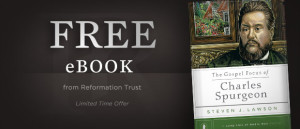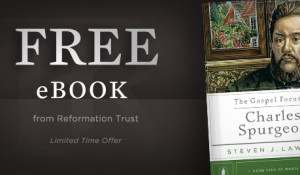 Sunday I downloaded my free copy of “the Gospel Focus of Charles Spurgeon” by Steve Lawson. Yesterday, I started reading it. Today I’m attempting to put into words the value of recommending this book to all readers. Ligonier Ministries is offering this free eBook download in the following formats until November 30, 2013; ePub, MOBI / Kindle and iTunes.
Sunday I downloaded my free copy of “the Gospel Focus of Charles Spurgeon” by Steve Lawson. Yesterday, I started reading it. Today I’m attempting to put into words the value of recommending this book to all readers. Ligonier Ministries is offering this free eBook download in the following formats until November 30, 2013; ePub, MOBI / Kindle and iTunes.
I will break my review down into three parts. I want to review it while it’s fresh on my mind. I’m a third of the way through the book today.
Even though I’ve not finished reading the book, Steve Lawson, has written as simple and flowing as he speaks.
If you have never read a biography of Charles Spurgeon you will find this to not be an overboard of history. For the readers of Charles Spurgeon, you will likely find the first third of the book will refresh your memory of this most unlikely candidate in man’s eyes to be titled ‘The Prince of Preachers’.
Lawson has crafted an historically attached snapshot of Charles Spurgeon in the first 35 pages. You’ll feel like you are getting to know Spurgeon as Lawson tells the story. You’ll hear Lawson speak of the influence Spurgeon had across the world. You’ll find that Spurgeon believed the Bible to be most important. I discovered some things about Spurgeon and his wife that endeared me to him and his care for his wife.
I’m looking forward to the next third of the book. As a matter of fact, as soon a I past in a smattering of quotes below, I’ll get back to reading. This is an enjoyable read thus far. Anyone else read or reading this book? Share your thoughts with me below, I’d love to hear what you think.
I had to limit myself to a few random quotes, otherwise I would be in violation of copyright laws if I posted all my favorites… it would be the first 35 pages. Here are a few. (get the book, it’s free for a few more days.)
“People warned Spurgeon that he would break down physically and emotionally under the stress of such expansive preaching. Spurgeon replied: “If I have done so, I am glad of it. I would do the same again. If I had fifty constitutions I would rejoice to break them down in the service of the Lord Jesus Christ.” He added: “We find ourselves able to preach ten or twelve times a week, and we find we are the stronger for it…’Oh.’ said one of the member, ‘our minister will kill himself.’… That is the kind of work that will kill no man. It is preaching to sleepy congregations that kills good ministers.” Spurgeon found strength in preaching.” (page 22)
“Several years later, in 1887, Spurgeon entered yet another conflict, the greatest of his ministry, known as the Downgrade Controversy. He spoke out in defense of the gospel, confronting the doctrinal decline that was becoming prevalent in many pulpits. He compared the Baptist church to a train that had crested a high mountain pass and was barreling down the steep grade, gaining speed as it plummeted. The further it descended this slippery slope, he contended, the greater its destruction wold be. He strongly warned against the undermining of the authority of Scripture, which was resulting in worldly entertainment, Vaudeville techniques, and a circus-like atmosphere in many churches in his day.” (page 23)
“Spurgeon clearly understood that the power of the gospel is built on the inerrancy of Scripture: “Everything in the railway service depends upon the accuracy of the signals. When these are wrong, life will be sacrificed. On the road to heaven we need unerring signals, or the catastrophes will be far more terrible.” If the Bible is to rightly direct men to God, Spurgeon contended, it must be entirely trustworthy. Therefore, no preacher is free to alter the biblical message, change its words, soften its doctrines, or withhold any truth.” (page 29)
“I hold one single sentence out of god’s Word to be of more certainty and of more power than all the discoveries of all the learned men of all the ages.” (page 31)
“An idler has no right in the pulpit. He is an instrument of Satan in damning the souls of men.” (page 32)



 I pick up the review of Steve Lawson’s book “The Gospel Focus of Charles Spurgeon” in chapter 3 (page35). The chapter title is “Sovereign Grace”. The never ending debate between Calvinism and Arminianism had all but disappeared as Spurgeon came preaching. The preaching of the puritans and the reformers were fading fast. But now so with Spurgeon. In this chapter, Lawson reminds all readers and preachers who love to quote Spurgeon that he refused to become “infatuated with the current theological fads.” Spurgeon refused and chose the old paths, the path through Scripture. The language of Scripture was the language Spurgeon spoke.
I pick up the review of Steve Lawson’s book “The Gospel Focus of Charles Spurgeon” in chapter 3 (page35). The chapter title is “Sovereign Grace”. The never ending debate between Calvinism and Arminianism had all but disappeared as Spurgeon came preaching. The preaching of the puritans and the reformers were fading fast. But now so with Spurgeon. In this chapter, Lawson reminds all readers and preachers who love to quote Spurgeon that he refused to become “infatuated with the current theological fads.” Spurgeon refused and chose the old paths, the path through Scripture. The language of Scripture was the language Spurgeon spoke.